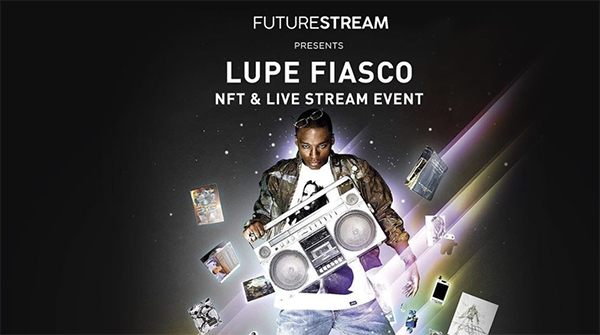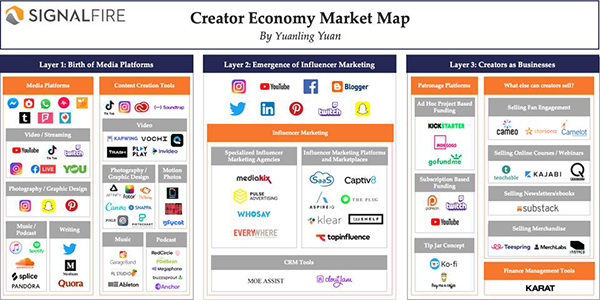 |
||||||||||
|
||||||||||
| Could NFTs Be a Boon for Publishers? |

Image sourced from FutureStreamTV
|
We’ve been sitting on the sidelines watching all of this NFTs (nonfungible tokens) hullabaloo with a considerable amount of caution. But it’s starting to look like there might be a lot more to this shiny, new object than just being the next round of blockchain hype. And there are loads of possibilities for publishers. Our senior editor was scrolling through her IG feed late one night, as she’s wont to do, and she came across an announcement that FutureStreamTV will be the first livestream platform to offer an immersive 360 NFT experience with Grammy Award-winning hip-hop artist, Lupe Fiasco. On April 12, Fiasco is dropping two open edition NFTs and an auction for NFT collections on Origin’s NFT launchpad, granting exclusive one-on-one experiences for fans. NFT holders will be given admission to a live performance of the artist’s Food & Liquor concert on April 15, followed by a live meet and greet. There will also be exclusive access to limited edition merch and premium digital content. There’s been a lot of talk about how NFTs can benefit visual artists and musicians, but in recent weeks there’s been a lot more emphasis on how NFTs are changing the game for digital content creators and how publishers are also getting in on the action. |
| It wasn’t at all lost on us a couple weeks back when The New York Times author Kevin Roose’s Buy This Column on the Blockchain! article sold for $560,000, in the first such sale for the paper of record. The winner of the digital collectible item will also receive other perks, including a voice message from Michael Barbaro, host of “The Daily” podcast. Other publishers are experimenting with NFTs as well. Quartz turned to OpenSea—the largest marketplace for NFTs, best known for selling cryptokitties collectibles—to sell the first NFT news article for $1,800. And the Associated Press sold artwork for $180k in ether. But like all good monetization schemes, NFTs are fraught with challenges—scams and fraud to name a few, as well experts are already predicting an unstable bubble. No one is yet expecting that NFTs will be a new permanent revenue stream for pubs, though publishers willing to experiment now can uncover myriad ways to cash in on their brand cache, endearing audiences and strengthening their relationships with them. In the life after cookies, pubs' relationships with their audiences will do wonders for building trust and opening the doors to users wanting to share their data to receive better experiences overall. If nothing else, the NFT movement is a lesson in community engagement that publishers should pay attention to. |
| Creator Economy Gets a Boost, but What Does It Mean for Premium Pubs? |

Image sourced from SignalFire
|
| When blogging landed on the digital media scene in the early aughts, it totally disrupted the media model and begot a new generation of content creators not directly connected to major media outlets. Mainstream pubs were slow to leverage those direct-to-reader relationships that bloggers created through comment and community-building tools, allowing the platforms to swoop in and create opportunities to build massive user-generated content stores they could sell advertising against. Mostly, these platforms take advantage of content creators, only sharing a minuscule percentage of the revenue with them. The stories of millionaire YouTubers are far and in-between. We’re entering a new phase now, where newsletter platforms are really taking off enabling independent authors to get paid for their writing, and even a mainstream publisher like Forbes has taken note and jumped on the bandwagon offering a 50-50 subscription revenue split to journalist entrepreneurs. Other platforms (video, livestreaming, publishing, podcast) are exploring micropayment, cryptocurrency, NFTs, and tip offerings for audiences to directly show their appreciation to content creators. Twitter’s Super Follows will allow influencers to put up a paywall between fans and select Tweets. Still, overall, the digital creators economy is broken. But audio chat darling, Clubhouse, is looking to shake things up. They’re developing a direct payment system via Stripe for content creators to earn 100% of revenue from their partnership with the platform, and it looks like this could be the dawning of a new era where content creators finally get their just due. |
| We could see the Clubhouse effect impacting premium publishers both negatively and positively. On the negative side, it’s going to create an extremely competitive landscape when it comes to sourcing talent. If talent can get 100% of revenue from a platform like Clubhouse, will we see more talented journalists, podcasters, etc. leaving salaried posts for these types of deals? On the positive side though, publishers could take a page out of Forbes’ book with an eye toward developing strategies for partnering with content creators in mutually beneficial relationships. While Forbes has a long history of platform journalism with their contributor network, their new newsletter endeavor will allow them to drill down on their verticals and take advantage of changing user behaviors, where users choose to follow an individual personality or content niche (or interest, if you will) where publishers can offer advertisers new ways of reaching their audiences. Another opportunity that Daniel Butler, a design-driven entrepreneur based in Oslo points out: “What if publishers used their curatorial prowess to activate a network of creators beyond their own channel?” Just think of how Complex Networks has focused less on advertiser revenue and built a revenue diversification strategy with daily and weekly shows where sponsors buy the interest and audience from the brand at a premium. At AdMonsters December PubForum+, Complex Networks CEO, Rich Antoniello, shared how the company’s multiprong strategy of building a fervent community, revenue diversification, and embracing new platforms have made Complex a publisher ready for whatever the future brings. Isn’t that just what every publisher wants? Wouldn’t it make more sense to cultivate fans vs users? |
| Around the Water Cooler |
|
Here's what else we're reading and talking about...
|
| @{optoutfooterhtml}@ |








